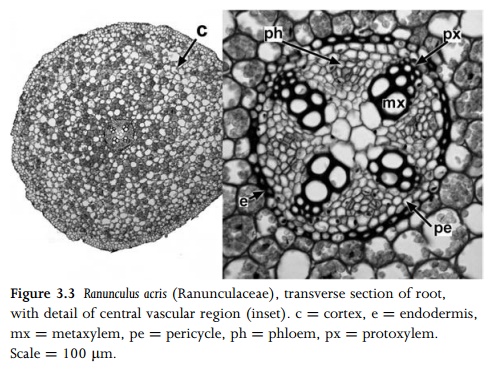Chapter: Anatomy of Flowering Plants: An Introduction to Structure and Development : Root
Pericycle and Vascular Cylinder
Pericycle and Vascular Cylinder
The
vascular tissue in the centre of the root is surrounded by a single layer (or
rarely, more layers) of thin-walled cells, termed the pericycle (Fig. 3.3).
Both the pericycle and vascular tissue are derived from cells on the proximal
(shoot) side of the quiescent centre. The pericycle is potentially meristematic
in younger roots, as it is the site of lateral root initiation, but in older
roots it can become lignified.

The
primary vascular tissue consists of several strands of phloem alternating with
the rays of a central area of xylem that appears star-shaped in transverse
section. In a mature root, the protoxylem elements, which were the first-formed
and are the narrowest in diameter, are located at the tips of the rays, nearest
to the pericycle. The metaxylem elements are larger and located closer to the
centre of the root. Both xylem and phloem are exarch in the root (i.e. they
mature centripetally). Similarly, the protophloem is located close to the
pericycle, in contrast with the metaphloem, which is situated closer to the
centre of the root.
Roots
possess two, three, four or more protoxylem poles (rays), in which case they
are said to be diarch, triarch, tetrarch or polyarch respectively. There is
often variation in the number of xylem poles, sometimes even within the same
plant, depending on the diameter of the root. Most commonly, roots possess
relatively few xylem poles (usually two, three or four) and the central region
is occupied by a group or ring of xylem vessels. However, some monocots (e.g.
Iris) possess polyarch roots, and the centre of the root is parenchymatous,
sometimes becoming lignified in older roots.
Related Topics